- Education
-
Research
Current research
Talent
-
Collaboration
Businesses
Government agencies and institutions
Alumni
-
About AU
Organisation
Job at AU
Beyond expectations, according to the researchers from Health who ensured that 47 international elite researchers were affiliated with the faculty as Honorary Skou professors exactly two years ago. We take stock of the initiative with examples of the academic collaboration that has – despite the pandemic – taken place across national borders.
2021.10.07 |
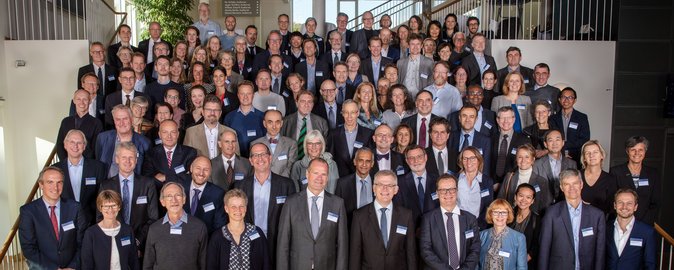
The Honorary Skou professors and their champions from Health on the day of the inauguration in October 2019. Photo: Søren Kjeldgaard
This month, it is two years since 47 professors from foreign universities were formally inaugurated as Honorary Skou professors at a ceremony in the Lakeside Lecture Theatres. The ceremony took place on the same day as Nobel Laureate Jens Christian Skou, from whom the scheme gets its name, would have turned 101.
The initiative to appoint a number of new professors was launched by the faculty management team in 2018 as a strategic effort to strengthen collaboration with leading research units abroad.
The aim was to establish more joint research projects and funding applications, offer new perspectives on teaching and PhD supervision, and generally create better and closer relations with researchers from some of the world's top 100 universities.
In practice, the Honorary Skou initiative has shown itself to be a catalyst that has sparked both formal and informal collaborations across national borders and research areas.
This is demonstrated by the evaluations from the so-called “champions” – researchers from Health who act as the academic contact and primary collaborative partner for the Honorary Skou professors.
"The evaluations have been especially positive and demonstrate a lot of diversity in the collaboration among all of the researchers. Seeing a strategic initiative bear fruit in this way and lead to so many specific projects is extremely gratifying," says Acting Dean Hans Erik Bøtker.
"The fact that we created the formal framework for the collaboration and actually held an inauguration ceremony for the Honorary Skou professors helped cement the affiliation with the faculty, and this in turn made it easier and more legitimate for our researchers to pursue the many opportunities for collaboration and develop academic and personal relationships," explains Hans Erik Bøtker with reference to the evaluations.
However, the feedback from the faculty's researchers also shows that the coronavirus was an obstacle for many of the planned exchange agreements, visits and research stays abroad.
Nevertheless, Hans Erik Bøtker does not hesitate to call the Honorary Skou professor initiative a success, and on the basis of the good evaluations, the Dean's Office has decided to continue the initiative with the aim of a new nomination round beginning in 2022.
“There’s no reason to stop here. We have room for more Honorary Skou professors from internationally recognised universities who can develop individual academic networks and strengthen Health's overall research environment," says Hans Erik Bøtker.
See the list of Honorary Skou Professors and their champions on the website

Champion: Cecilia Ramlau-Hansen, professor, Department of Public Health
Honorary Skou professor: Onyebuchi A. Arah, professor, University of California Los Angeles (UCLA), USA
"Professor Arah has taught on one of our recent epidemiological PhD courses, ‘Causal inference in Health sciences’. It's a methodological course and the material isn’t at all easy. But it’s a field in which Arah is incredibly skilled and knowledgeable. A bit of a pioneer in fact.
We held the course for the first time in 2019, where Arah flew in and lectured. Afterwards, he offered ‘open hours’ where both employees and students could ask questions and discuss with him. That was enormously useful. This year, we held the teaching online. On both occasions, our PhD students have given the course excellent evaluations, and one of them actually proposed that the course should be compulsory for all PhD students at Health.
I met professor Arah for the first time at a dinner with my mentor, who was head of department at UCLA, while I was a PhD student on a research stay over there. I floated the idea of collaborating and, fortunately, Arah was very interested, and he is really pleased to have been appointed a Honorary Skou professor.
Both myself and several of my PhD students have already been on research stays with Arah and more will follow. This means that we now have and continue to develop our competences at Health to teach in Arah’s specialist area on our PhD course. Being able to send people to UCLA to learn more and having Professor Arah come here and sprinkle a little stardust over the entire course is invaluable for us."
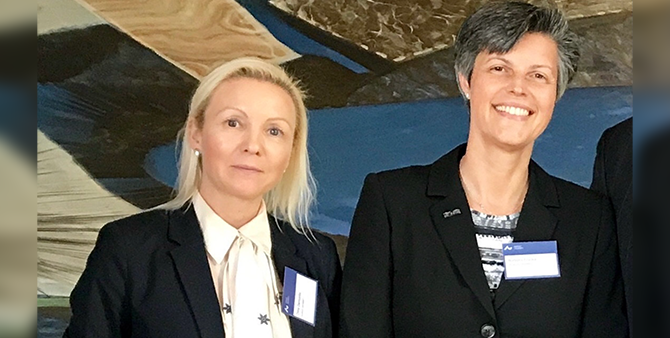
Champion: Ditte Demontis, associate professor, Department of Biomedicine (left)
Honorary Skou professor: Barbara Franke, professor, Radboud University, Holland
"Barbara Franke and I have worked together on a major EU Horizon Europe application. We both conduct research into ADHD, and in our joint project our objective is to gain a better understanding of the psychiatric diagnosis when it occurs together with depression. Barbara Franke manages the entire application, and I’m what’s known as a work package leader on the section of the project that deals with the genetic part, where we make use of different databases, registers and biobanks.
We submitted the EU application at the end of September, so the last few months have been very intensive. We’ve been in close contact with weekly Zoom meetings during which we’ve discussed aspects such as the design of the study, which samples we should use, etc.
I already knew Barbara Franke as we’re both interested in the same field of research. We already worked together before she was appointed as an Honorary Skou professor, but I think the scheme has helped intensify our collaboration, and in this way it’s been easier and more manageable to embark on such a big EU application project."
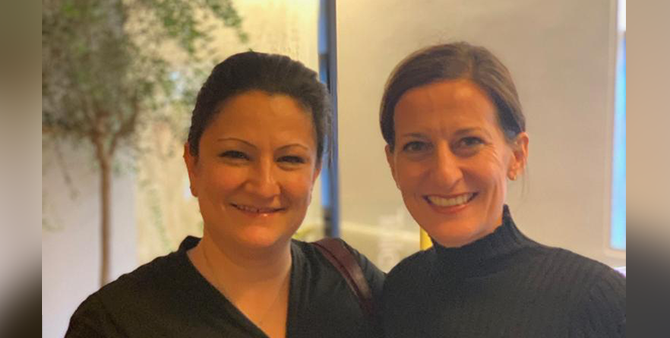
Champion: Golnoush Bahrami Møller, associate professor, Department of Dentistry and Oral Health (left)
Honorary Skou professor: Irena Sailer, professor, University of Geneva, Switzerland
"I certainly knew who Irena Sailer was before she became an Honorary Skou professor – but only by name. She’s a very big name in the field of digital prosthetics. But I sent her an email and asked if she wanted to become our honorary professor. She probably thought it was spam, because she didn't respond until I sent a second email. Fortunately her reply was positive, and since then we’ve had a really close and productive academic collaboration, while on a more personal level we’ve really also bonded in a kind of sisterhood.
That’s why I could allow myself to ask if she would like to participate in the section's monthly journal club and hold a webinar on prosthodontics in the digital age, primarily aimed at our clinical teaching staff. And because she is an international hotshot, we chose to open the doors, announce the webinar broadly and invite everyone with an interest to our own journal club special. It was a huge success, and the participants included students, researchers and dentists from all over the world.
If Irena Sailer had not been an Honorary Skou professor, I would never have asked one of the world's leading researchers within the field of prosthetics whether she would give a free presentation on a Tuesday evening in April. Now that things are in place, we’re going to repeat the success with another webinar from the University of Geneva in 2022."
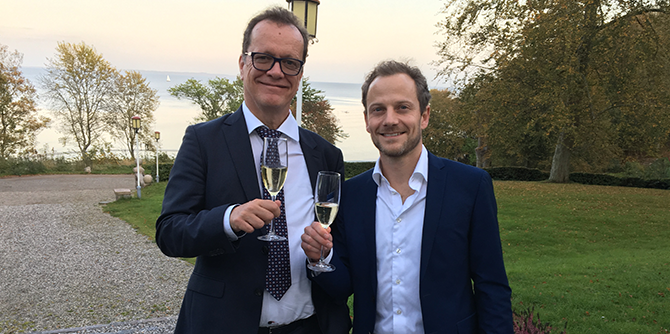
Champion: Simon Tilma Vistisen, associate professor, Department of Clinical Medicine (right)
Honorary Skou professor: Thomas W. L. Scheeren, professor, University of Groningen, Netherlands
"I got to know Thomas Scheeren in 2017 when I was on a research stay in the Netherlands via my Sapere Aude grant. Since then we’ve worked together a fair bit, so it was natural to formalise the collaboration with the Honorary Skou professor title when we had the opportunity.
I believe that both the travel expenses we were given and in particular the days around the solemn inauguration have made a difference, because these initiatives have shown our honorary professors that the university really prioritises hosting the many collaborations. In my experience, the appointment has strengthened ties and led to greater dedication to the collaboration from both sides.
Thomas Scheeren is among other things co-supervisor on my PhD student’s project focusing on how treatment with a ventilator affects the heart and blood circulation during major surgery and during hospitalisation in an intensive care unit. Thomas Scheeren is professor of anaesthesia and he is an international capacity in the area, so having him as a co-supervisor has been rewarding both for me personally and not least for my PhD student."
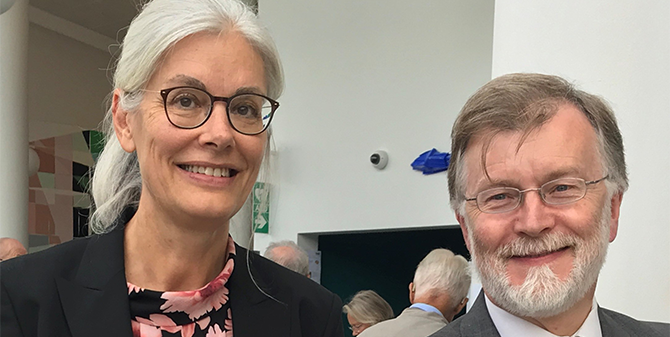
Champion: Lisbeth Uhrskov Sørensen, associate professor, Dept. of Clinical Medicine
Honorary Skou Professor: Harry G. Kennedy, professor, Trinity College Dublin, Ireland
“Danish forensic psychiatry is a narrow field of research with a narrow patient base and few Danish forensic psychiatric research environments. This means that international research collaboration is absolutely vital. The appointment of Harry Kennedy as Honorary Skou Professor has played an invaluable role in the development of our forensic psychiatric research activities.
Before the Honorary Skou programme, we were in touch occasionally, but the honorary adjunction has definitely boosted our research collaboration – e.g. on PhD supervision, congress participation, exchange of medical students on short research stays, participation in an Irish Journal club and of course actual research projects . Ever since the appointment, we have had regular telephone meetings where we discuss joint projects, develop new activities and discuss our common field. Right now, we are working on a collaborative international 'model of care' project, where we map European forensic psychiatry, and in addition, we are planning Harry Kennedy's visit to Aarhus in November. Here, one of our goals is to strengthen research collaboration with other Danish forensic psychiatrics.
The fact that we now have a more formal working relationship based on forensic psychiatric research means that helping each other out is not just a personal favour. On the contrary, it is a formalised part of the Honorary Skou collaboration.
Harry Kennedy is one of the leading forensic psychiatrists in the world with an impressive forensic psychiatric network in Europe, which he generously shares. He has invested time and skills in the Honorary Skou collaboration, and it is also our experience that Professor Kennedy is happy with the collaboration with Aarhus University and our department.”
Acting Dekan Hans Erik Bøtker
Aarhus University, Health
Phone: 40 29 33 89
Mail: boetker@au.dk